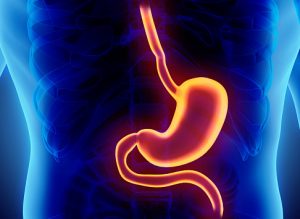 Consistently dropping items or having slowed movements is not something we all face on a daily basis, but those with Parkinson’s disease live with it every day. The feeling that you don’t have complete control of your body can be an extremely frustrating experience, especially when you don’t know the cause. But according to new research conducted by the American Academy of Neurology (AAN), Parkinson’s disease may possibly start in the gut first, then work its way up through a cranial nerve and into the brain.
Consistently dropping items or having slowed movements is not something we all face on a daily basis, but those with Parkinson’s disease live with it every day. The feeling that you don’t have complete control of your body can be an extremely frustrating experience, especially when you don’t know the cause. But according to new research conducted by the American Academy of Neurology (AAN), Parkinson’s disease may possibly start in the gut first, then work its way up through a cranial nerve and into the brain.
While only a preliminary study, researchers examined people who had a particular type of surgery that removed part of the vagus nerve, called a vagotomy. This cranial nerve is typically responsible for controlling unconscious bodily processes like heart rate and food digestion and can be removed in the case of first line treatment for intestinal ulcers. By using data collected from national registers in Sweden, the researchers compared 9,430 people who had this surgery over a 40-year period to 377,200 people from the general population. They discovered that in this time period, 101 people who had a vagotomy developed Parkinson’s disease—1.07 percent. This finding was not considered significant, as they also found that within the general population, only 1.28 percent developed Parkinson’s in the same time frame.
Advertisement
However, upon further investigation into the type of vagotomy performed, those who had the entire vagus trunk removed—called a truncal vagotomy—at least five years earlier were found to be less likely to develop Parkinson’s disease than those had not had the surgery and had been followed for at least five years. Further investigation showed that 19 people who had a truncal vagotomy at least five years earlier developed the disease, or 0.78 percent, compared to 3,932 people from the general population who hadn’t had any such surgery and were followed for at least five years, at 1.15 percent. Of those who have a selective vagotomy—only some branches of the vagus nerve removed—five years earlier, only 60 were found to develop Parkinson’s disease, or 1.08 percent.
This detailed look at which type of vagotomy performed provided much more valuable insight into this correlation, and after adjusting for factors such as chronic obstructive pulmonary disease (COPD), diabetes, arthritis, and other conditions, the researchers concluded that those who had a truncal vagotomy at least five years earlier were 40 percent less likely to develop Parkinson’s disease.
“These results provide preliminary evidence that Parkinson’s disease may start in the gut, other evidence for this hypothesis is that people with Parkinson’s disease often have gastrointestinal problems such as constipation, that can start decades before they develop the disease. In addition, other studies have shown that people who will later develop Parkinson’s disease have a protein believed to play a key role in Parkinson’s disease in their gut,” said study author Bojing Liu of the Karolinska Instituet in Stockholm, Sweden.
The researchers acknowledge that despite having a large pool of subjects for this study, they couldn’t control all potential factors that could affect the risk of Parkinson’s disease, such as smoking and genetics. More research will be needed in this area.
